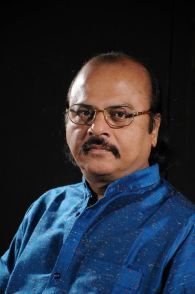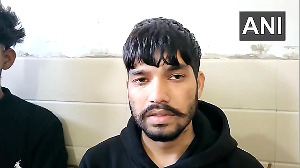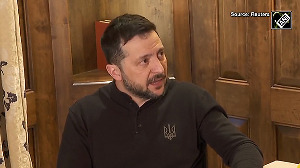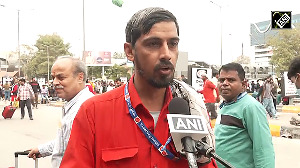 'It is widely believed that such posts require lobbying. Maybe they do, but I can say this straight up, I did not lobby. This appointment has been on pure merit. My lobby is myself and I don’t need to lobby,' Waman Kendre, newly-appointed director of NSD, tells Neeta Kolhatkar
'It is widely believed that such posts require lobbying. Maybe they do, but I can say this straight up, I did not lobby. This appointment has been on pure merit. My lobby is myself and I don’t need to lobby,' Waman Kendre, newly-appointed director of NSD, tells Neeta Kolhatkar
Waman Kendre, who will take over as the director of National School of Drama, is a renowned theatre person from Mumbai, a practitioner of theatre and a teacher. Among his landmark plays that are still talked about are Mohandas, Ranangan, Janeman, Madhyam Vyayog, Zulva (remembered for is music and sterling performances based on a story of Devdasis), Tempt Me Not and Dusara Samana. In fact his Madhyam Vyayog, a Sanskrit play, was performed in three other languages -- English, Hindi and Marathi -- and on the same day in 2011.
His plays have always received a tremendous response and has a devoted Marathi audience.
As a teacher, Kendre has conducted over 250 workshops for professional directors, actors and even children in India and abroad. He is known to have trained many talented actors and directors who are the leading names in cinema, theatre and TV today.
An NSD alumnus, Waman Kendre did his post-graduation there specialising in folk and ritualistic theatre of Kerala. In fact, Waman Kendre, who believes in research and documentation, also helped set up theatre documentation for the National Centre for Performing Arts in Mumbai. He has won many prestigious awards including a national award for outstanding multifaceted contribution to the field of theatre arts. His last posting was as the head of the department of theatre arts in Mumbai University.
In a telephonic interview with Neeta Kolhatkar, he speaks about his new assignment as head of the NSD.
Congratulations! You are the first Maharashtrian and first Marathi theatre director to be appointed as head of the National School of Drama. This is a big achievement as you bring over 30 years of experience.
Yes, my janmabhoomi has been Maharashtra and without doubt Marathi theatre has been pioneering. I’m happy to be a part of it. My success and achievements may have been in Marathi, but when I studied at NSD I got a national and international perspective. Marathi theatre has been progressive and a leader among the many thriving regional theatres that we’ve had in India. It is not only an honour to become a director of NSD, it is also a way to give back to the field where I’ve done some qualitative work.
Usually it is perceived that such posts require tremendous lobbying, because they are decided by the government. Did you have to lobby?
Yes, it is widely believed that such posts require lobbying. Maybe they do, but I can say this straight up, I did not lobby. This appointment has been on pure merit. I am sure the Government of India must have given due consideration to my ability and the contribution made by me. If I had not got this opportunity, I would’ve shrugged it off and strongly believe that the person must have been better than me. My lobby is myself and I don’t need to lobby.
What is your vision for making the NSD a truly national theatre centre? How would you take it to the grass roots and across India to give it a feel of national platform?
Theatre has its own language and in that sense, the NSD s a truly national platform. At NSD we are shown German theatre in the original language, likewise at NSD we are shown original Marathi and Kannada and plays of other languages. But, yes, we need to take cognisance of the work being done in various regional languages and this message needs to be sent across.
I am planning to involve the teachers, people who have been involved in NSD before, take their views and have branches like the IITs do at various places. The NSD too can have branches in every region. Within the local requirements, implement a model so that every state can have a centre.
It will primarily help us achieve two main goals. One, that we can reach the grass roots, where there can be some real good talent and NSD has to reach them. The second being that the audience drives theatre, through what they want to see and appreciate. The sharing and output that we can get from them. If the NSD can make such a network then we will truly be the national face of Indian theatre.
This obviously drives us to one important lacuna, that we just do not have documented history of our various regional theatres. Would you push for an NSD research centre? A one-stop place to get information on theatre across India?
We are a careless society when it comes to documenting and reading our own history. We speak of Bal Gandharva and his success, but when it comes to actual documentation, the picture is rather grim. The impact of theatre is immediate and tremendous. Marathi theatre itself is a success story, likewise Bengali theatre too. They both have a tradition of over 200 years of being a success story. The effort is to assemble the pieces of this fortress of 200 years and integrate them into our education system. At the NSD, we are trying to do it. The impact of theses studies need to reflect in our working. Theatre in all languages deserves a mention and due honour.
Why only Bal Gandharva, let’s speak of Nilu Phule, Bhakti Barve, there is absolutely little or nothing to see their performances on film which can be shown as studies and imbibed. When there is no such option, how to contemporise these performances of Bal Gandharva, Bhakti and Nilu Phule? Right now we have mostly verbal documentation, which doesn’t teach you the principles of performance or grammar.
There are a few good centres and individuals who have documented research on theatre, but this is all in pockets, but no integrated effort. There is no opportunity for advanced studies in this stream of academics. Hence, our students are forced to go abroad to study. Such research and studies are the need of the hour and only the NSD is capable of tackling it.
Theatre festivals have become more of landmark dates for registering appearances. How would you make it more real, an interactive festival event, where one can scout for talent and openings?
The old tradition of adda, katta culture fostered informal exchanges between theatre students, enthusiasts and stalwarts. It helped in grooming, talent-spotting and exchange of ideas. Due to changing lifestyles, these exchanges have stopped. Likewise, the multi-disciplinary exchanges and networking too have stopped. Performing arts people would interact with artists, musicians and there was a need to learn from each other. I do believe we need more of such. Yes, such plans are in the offing, but right now in the planning stage. I need to throw it open to the teachers at NSD, my seniors, and take their ideas too.
Do you believe you will be allowed to fulfill your plans and dreams for NSD?
Why not? I am a very positive and hopeful person. When I was first asked to join MumbaiUniversity, I was diffident, most around me dissuaded me saying I would get frustrated, I wouldn‘t be allowed to do anything. The minute I said yes, I went with an open mind, let’s give it my best shot. Since the last 10 years I’ve been here, it has been a positive experience. It depends on one’s approach. I believe we can change people and their spirit. Why stop dreaming? One should keep dreaming and then strive to fulfill them.
Theatre isn’t a vision of one person alone, it is a contribution of others’ vision too. I want to make NSD a qualitative, talented and beautiful place.






 © 2025
© 2025